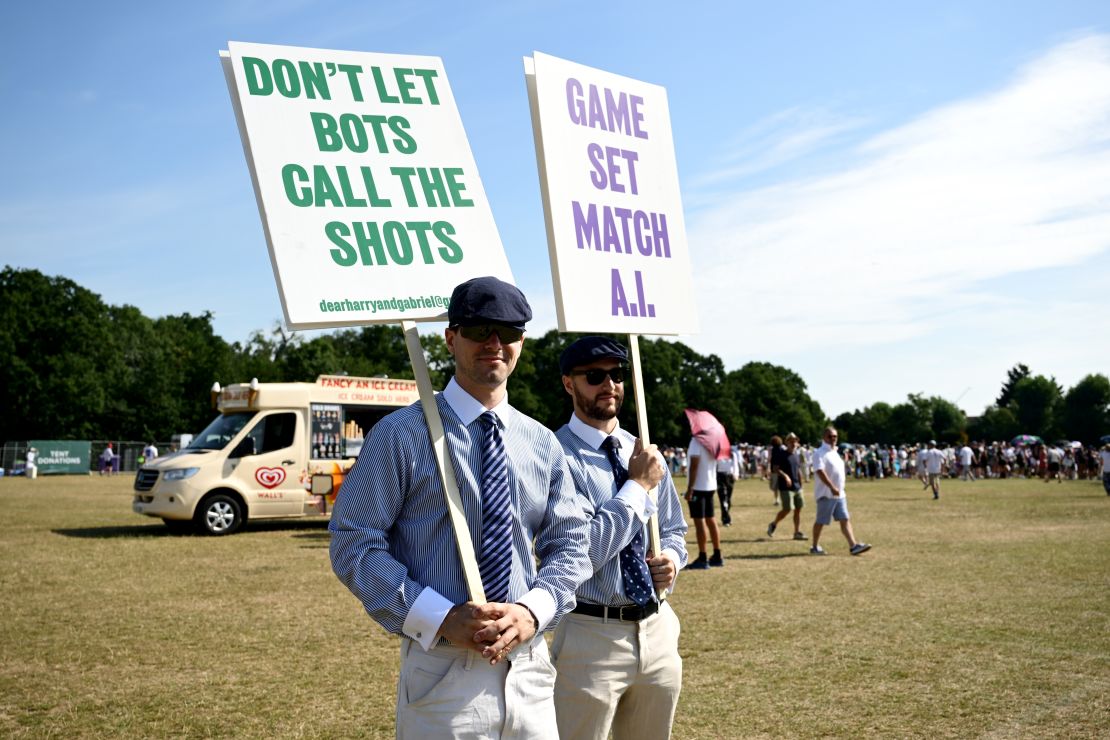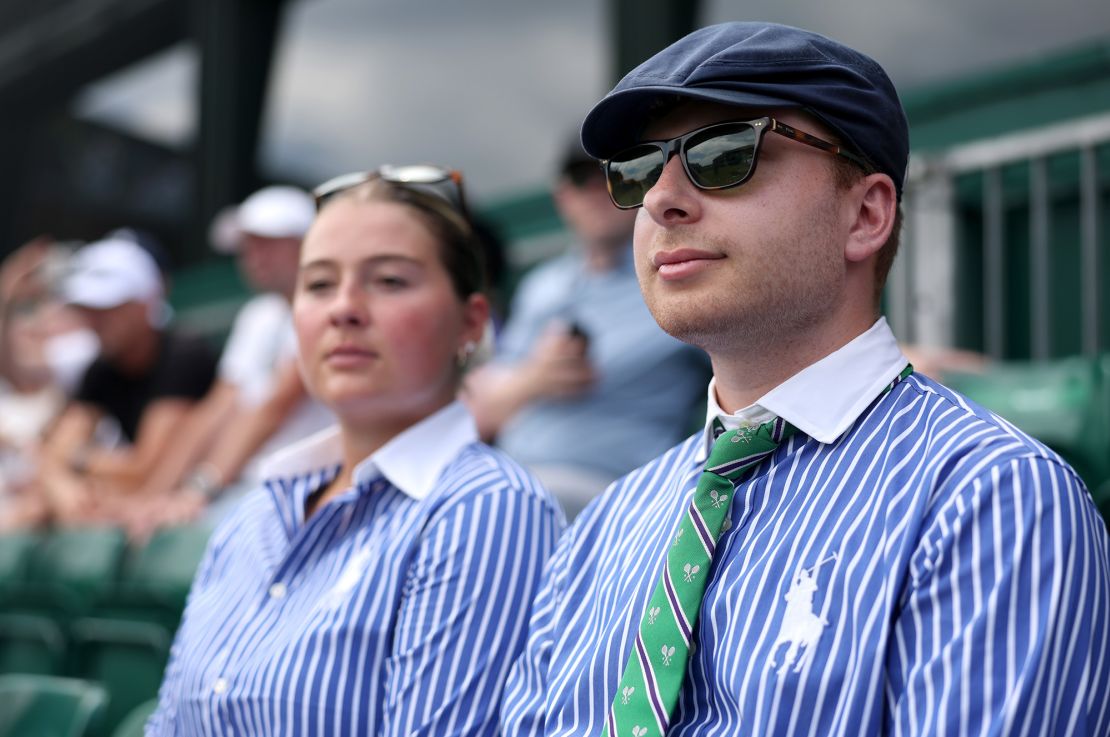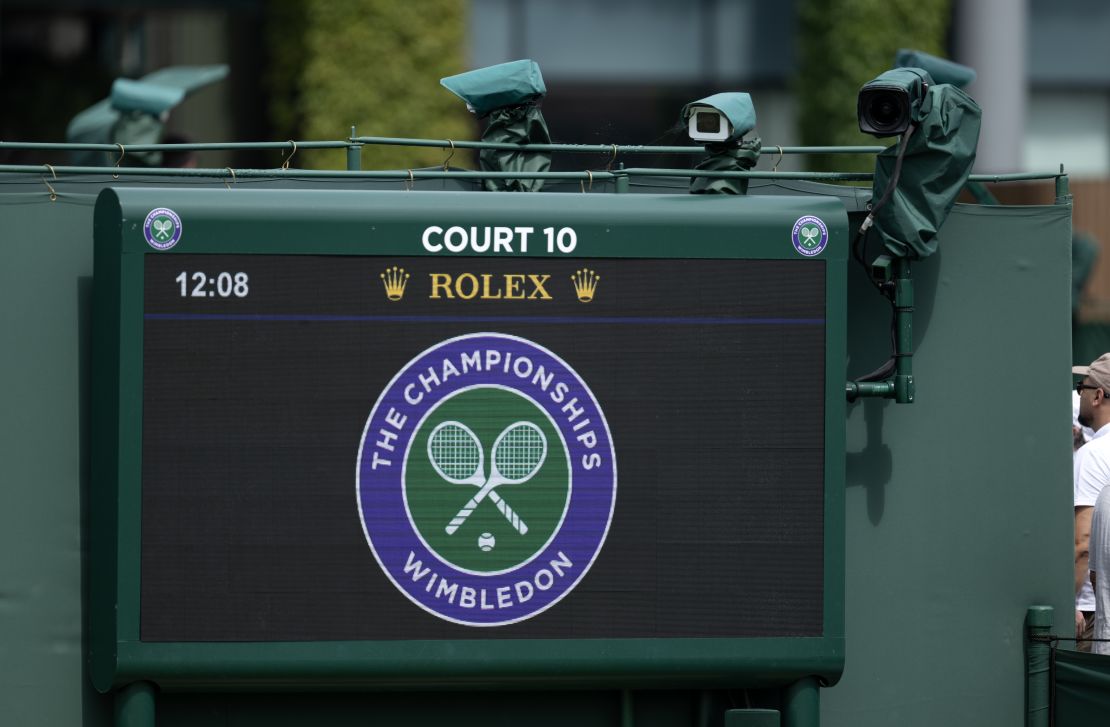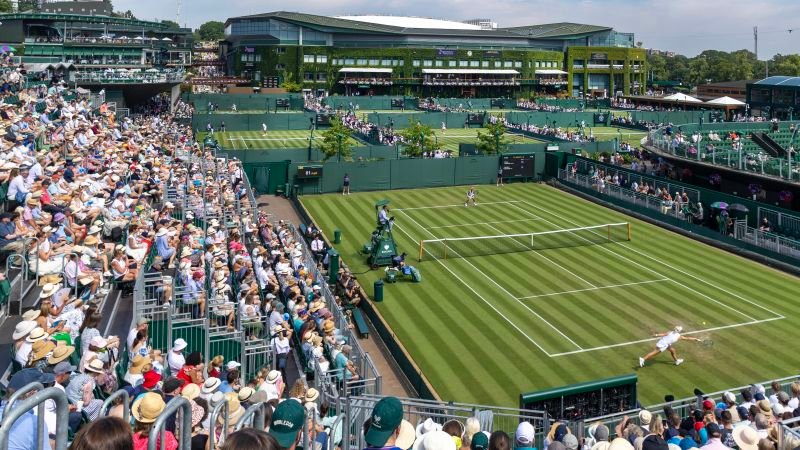The All England Lawn Tennis Club, London
CNN
—
Pauline Eyre still remembers the “extraordinary feeling” of making her first appearance at Wimbledon aged 21, taking in the noise and the crowds as she marched onto the pristine grass courts, neat and pillowy under her feet.
Eyre, however, had no intentions of hitting a serve or swiping at a forehand, nor dreamed of lifting a trophy in two weeks’ time. She even calls herself “a pretty bad junior player” who regularly lost in the first round of local tournaments.
But under the looming shadow of Centre Court, she had reached the pinnacle of her vocation as a line judge. That moment, Eyre tells CNN Sports, was “a great feeling of pride … going out as that team of people so visibly different.”
Line judges have long been an iconic and instantly-recognizable facet of Wimbledon, decked out in Ralph Lauren uniforms and often considered the sporting world’s best-dressed officials.
But as of this year, that tradition has come to an end. Organizers announced in October that an electronic calling system would be introduced at future tournaments, doing away with human line judges.
For someone like Eyre, who called the lines at Wimbledon on 16 occasions, the decision marks a sad chapter in the tournament’s near 148-year-old history.
“At the end of the day, a tennis match is sport, and sport is about people,” says Eyre. “And I don’t think technology necessarily makes everything better. I don’t think it’s improving the quality of the line calling because line calling was always excellent.
“It takes away that bit for the players where they need to deal with adversity. If they don’t like a call, they can’t argue with the technology. … It’s about the player who does the best in adversity. You take away the humanity from tennis, you’re taking away a lot of what it is: human beings striving against each other and competition.”
Line judges, Eyre adds, were “part of the furniture of the court” at Wimbledon, their uniforms “so striking and so different to any uniform anywhere else in the world.”

But the tournament’s shift to electronic line calling (ELC) is in step with the rest of the tennis world. The ATP and WTA Tours have adopted the system, as have the Australian and US Opens. Roland-Garros remains the only grand slam competition using human line judges for “out” and “fault” calls.
For Wimbledon to follow this trend might not seem like a particularly radical move, but the grass-court grand slam, brimming with history and old-school values, is often viewed as a separate entity to other tournaments, a world unto itself.
The decision, according to All England Lawn Tennis Club (AELTC) chief executive Sally Bolton, was made to ensure “maximum accuracy in our officiating” and to give players “the same conditions” as for most other events on tour.
“(It) was probably inevitable,” Andrew Jarrett, the tournament referee at Wimbledon between 2006 and 2019, tells CNN Sports. “It is almost certainly correct to go down this route. Why? Well, provided it is set up correctly – and that’s crucial – then you get a very good result, and it’s proven to be better than human eyesight, so therefore it’s seen as being an improvement.
“From a technology point of view, if it exists and if it improves, why wouldn’t you use it as the line that’s been taken across the world?”
Jarret, however, acknowledges the “cost to the human side” of the sport, as well as disincentivizing young officials who can no longer aspire to call lines at Wimbledon.
Eyre makes the same point. “You have to be a bit of a saint to want to spend your weekends umpiring children’s tennis matches at the local club without the carrot of Wimbledon at the end of it,” she says. “Why would a 15-year-old who’s a club tennis player or a county tennis player want to go into line judging when there’s nothing really in it for them?”
As for the players, the reaction has been mixed. Women’s top seed Aryna Sabalenka said that she is “50/50” but “probably leaning towards the electronic system” because it removes the question of challenging a line judge’s call.
But defending women’s champion Barbora Krejčíková said that she “like(s) the old traditional style,” while American star Frances Tiafoe enjoyed the “fanfare” of being able to challenge a line judge.
There have been occasional teething issues with electronic calling, too. During Wednesday’s second-round match between Madison Keys and Olga Danilović, the automated system made an unprompted “out” call between points, causing brief confusion and a ripple of laughter from the crowd.
And after her first-round match on Court 8, located in one of the busiest parts of the grounds, China’s Yuan Yue said that the automated calls were sometimes too quiet to hear.

From observing other tournaments, Eyre also thinks that electronic calls aren’t always loud enough. Line judges, by contrast, are instructed to shout their calls clearly.
“We had to sell the call: out, definitely, it’s out, in one very short, sharp syllable,” says Eyre. “It did feel a bit odd when they were super calm – it changed the environment, changed the atmosphere.”
CNN Sports has contacted Wimbledon organizers for comment on the volume of the electronic line calls.
According to Reuters, the tournament’s pool of around 300 line judges has been reduced to 80 at this year’s event, with those remaining deployed as “match assistants” who step in should the ELC system fail.
Wimbledon first used Hawk-Eye cameras to provide electronic officiating in 2007, and since then players have been able to “challenge” the calls made by human line judges, potentially overturning a decision against them.
Jarrett was serving as the tournament referee when Hawk-Eye was introduced, but says that scrapping line umpires “was not on the agenda” during his time in office, which ended six years ago.
“There was no real suggestion for the replacement of line umpires,” he says. “I think we all knew right from the outset that we were starting a journey that would possibly lead to this one day, but that was not on the immediate horizon.”
As for Eyre, she felt that the threat of her old job being extinguished “was always there” once HawkEye was introduced, even though she thought it simply proved that line judges were “almost always” correct during player challenges.

“After a while, I think it made us more confident that we knew that we were doing it right, and that was really good,” she says.
But even that wasn’t enough to save the jobs of line judges, who are now destined to be talked about with a nostalgic appeal by the sport’s traditionalists.
Like many things in life, the charm of a Wimbledon line judge is perhaps only being appreciated once they’ve been taken away. That might feel ironic to someone like Eyre, who these days is a stand-up comedian using her line-judging days as a source for material. She never saw herself as a popular figure among players at Wimbledon, once being stared down by John McEnroe – the most famous protestor of a line call – and on another occasion getting booed by the crowd for foot-faulting home favorite Greg Rusedski.
Line judges, she thinks, had a reputation as failed players and hangers-on, “terribly officious people who wanted to exert some power.”
But the true reason they devote so much time to the cause, Eyre believes, runs much deeper: “We just wanted to be part of something we loved.”

